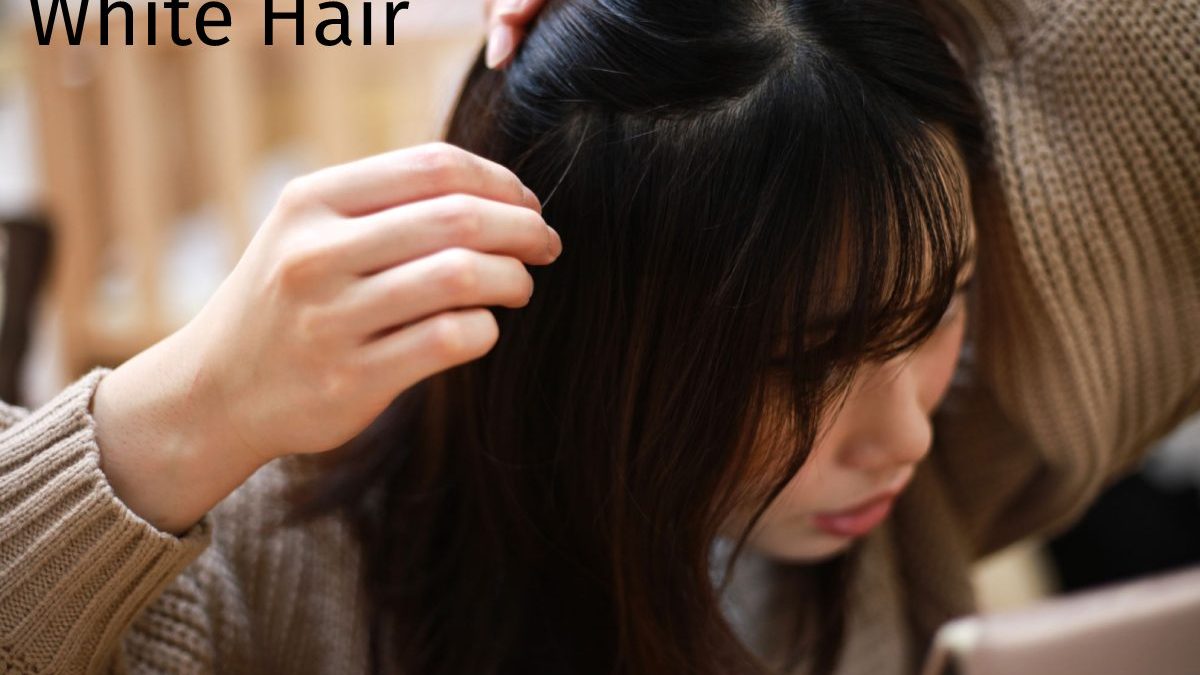White Hair – Your hair turns gray or white due to a loss of melanin, a pigment component that produces melanocyte cells. These are the natural color of your hair and skin. The less melanin you have, the lighter your hair. Gray hair contains minimal melanin, while white hair does not.
There is a lot of misinformation about getting back to your natural color once your hair has started to turn gray or white.
Although certain nutrient deficiencies and specific health conditions can cause premature gray hair, it is impossible to regain its natural color if your gray hair is genetic or due to natural aging.
If you want to help stop the rate of gray hair, dietary changes can be effective, but only if deficiencies are the root cause. Here we’ll bust some of the most common myths about treating gray hair and explore other ways to manage your hair color.
Table of Contents
Why You Can’t Change Your Hair Color Permanently
In the center, the hair is naturally white. However, based on genetics, melanin is responsible for the hair color with which you are born. Your hair follicles contain the cells that melanin uses to create pigments, which combine with protein keratins.
The loss of melanin in the hair occurs naturally, especially after the thirties. So if your parents experienced premature graying, chances are you’ll observe the same.
Despite claims made online and by product vendors, it is not possible to reverse white hair color if the cause is genetic.
Once your hair follicles lose melanin, they can’t produce any more on their own. So when melanin production slows down, your hair turns gray and white when melanin production has completely stopped.
Nutritional Deficiencies
If you eat a balanced diet, your gray hair is not related to any nutritional deficiency. However, if your diet lacks certain nutrients, it could very well affect melanin production in your hair follicles. Vitamin B-12 is the most common culprit, with folate, copper, and iron deficiencies also increasing your risk.
Supplements can contribute to these deficiencies, and you may see your natural hair color begin to regrow after several weeks. Nevertheless, you should consult your doctor before buying dietary supplements. He will give you blood tests to check if you need them.
Taking supplements to treat gray hair won’t work unless you have a diagnosed deficiency in one of these nutrients.
Underlying Health Conditions
Premature graying of hair is also attached to specific health conditions, including
- Vitiligo.
- Thyroid disease.
- Alopecia areata.
- Hormonal fluctuations can also play a role in graying hair. Managing these medical issues could, in theory, help restore your hair’s natural melanin and color over time.
Myths About Restoring Hair Color
Gray hair is a natural process influenced by aging, genetic factors, nutritional deficiencies, and medical conditions. Yet some websites continue to promote natural remedies and market products that promise to help you regain your natural hair color.
Supplements For Gray Hair
Given the role of certain nutrients in overall melanin production, some manufacturers promote supplements for gray hair. The most popular ingredients are biotin, zinc, and selenium, as well as vitamins B-12 and D-3.
However, the same rule applies here: Unless you have a diagnosed nutritional deficiency, these supplements will not reverse the lack of melanin production that contributes to your gray hair.
Hair Masks
A whole host of homemade hair mask recipes are said to darken gray hair. The most common ingredients are coconut oil, lemon juice, and essential oils – all intended to reduce inflammation and boost antioxidants in the scalp.
Although your hair will be soft and shiny to the touch, hair masks are unlikely to stimulate melanin production.
How To Slow The Appearance Of Gray Hair
Unless you have a nutritional deficiency or an underlying medical condition, there is no definite way to prevent gray hair, per se. However, some remedies may help slow the onset of gray hair.
- Stress management, as stress hormones can interrupt melanin production in hair follicles.
- Quitting smoking can be difficult, but a doctor can suggest a quit plan that’s right for you.
- Maintain your weight.
- Reduce your exposure to chemicals and pollution.
- Protect your hair from the sun by wearing hats and scarves.
What You Can Do If You Don’t Like Your Gray Hair
If the melanin losses in your hair are due to genetics, there is no way to reverse it. However, if you don’t want your hair to turn gray, you can consult a hairstylist for different options, including permanent and semi-permanent dyes. Root touch-up powders and creams can also work if you’re trying to hide some grays.
Natural hair dyes are other options to consider if you want to avoid potential hair damage from commercial products. Possibilities include henna and Indian gooseberry. On the other hand, you can embrace your gray hair with gray hair care products. Not only do these improve your hair color, but they also prevent your gray hair from turning yellow and brittle.
Conclusion
The risks of premature graying depend on how the hair follicles produce melanin. Stress, nutritional deficiencies, and other lifestyle factors can stop melanin production. Once this problem resolves, melanin is restored.

